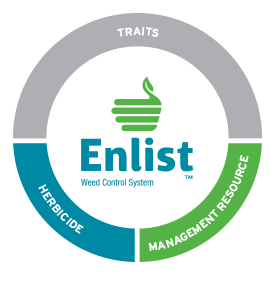25
Nov
EPA Revokes Registration of Toxic Pesticide Central to Genetically Engineered Agriculture
(Beyond Pesticides, November 25, 2015) In response to a lawsuit filed by environmental groups, the U.S. Environmental Protection Agency (EPA) yesterday revoked the registration of the toxic herbicide “Enlist Duo,” which contains the cancer causing 2,4-D and is central to future uses of genetically engineered (GE) crops in chemical-intensive agriculture. The marketing of this chemical in genetically engineered agriculture has become integral to the chemical industry’s response to weed resistance to the widely used herbicide glyphosate (Roundup), also identified as cancer causing this year by the International Agency for Research on Cancer (IARC).
 “Instead of looking for genetically engineered silver bullets that result in crop failure, we should be expanding organic agricultural systems that are productive and profitable, protect public health and the environment and slow global climate change,” said Jay Feldman, executive director of Beyond Pesticides.
“Instead of looking for genetically engineered silver bullets that result in crop failure, we should be expanding organic agricultural systems that are productive and profitable, protect public health and the environment and slow global climate change,” said Jay Feldman, executive director of Beyond Pesticides.
Approved by the agency just over a year ago, Enlist Duo is a combination of glyphosate and 2,4-D that Dow AgroSciences developed for use on the next generation of GE crops. EPA stated it is taking this action after realizing that the synergistic effects of the combination of these chemicals is likely significantly more harmful than it had initially believed, and that very small buffer zones it had required are not adequate to protect vegetation.
This action resolves a year-long legal challenge filed by a coalition of conservation groups, including Beyond Pesticides, seeking to rescind the approval of the dangerous herbicide blend, and challenging EPA’s failure to consider the impacts of Enlist Duo on threatened and endangered plants and animals protected under the Endangered Species Act. EPA had approved use of Enlist Duo in Illinois, Indiana, Iowa, Ohio, South Dakota, Wisconsin, Arkansas, Kansas, Louisiana, Minnesota, Missouri, Mississippi, Nebraska, Oklahoma, and North Dakota, and had intended to approve it in additional areas in the near future.
Enlist Duo has been marketed as a “solution” for the control of glyphosate-resistant weeds brought on by the widespread use of the chemical on glyphosate-tolerant (Roundup Ready) crops over the last decade. These super weeds now infest tens of millions of acres of U.S. farmland. However, independent and USDA scientists predict that the Enlist Duo “crop system” will only foster resistance to 2,4-D in addition to glyphosate, thus continuing the GE crop pesticide treadmill and escalating the cycle of more toxic pesticides in the environment. Additionally, the health effects of both 2,4-D and glyphosate are well documented. 2,4-D has been linked to soft tissue sarcoma, non-Hodgkin’s lymphoma (NHL), neurotoxicity, kidney/liver damage, and harm to the reproductive system. Glyphosate has been recently classified as a human carcinogen based on laboratory studies by the World Health Organization (WHO) in March.
As the crisis in weed resistance escalates, threatening crop productivity and profitability, advocates point to organic agriculture as a solution that protects public health, the environment, and farmers’ livelihood. By utilizing ecological pest management strategies, organic practices, and solutions that are not chemical-intensive are the most appropriate and long-term solution to managing unwanted plants, or weeds. Additionally, organic agriculture is an ecologically-based management system that prioritizes cultural, biological, mechanical production practices, and natural inputs. By strengthening on-farm resources, such as soil fertility, pasture and biodiversity, organic farmers can minimize and even avoid the production challenges that most genetically engineered organisms have been falsely-marketed as solving. To learn more about organic agriculture, see Beyond Pesticides Organic Program Page.
The suit was filed by Earthjustice and Center for Food Safety, on behalf of Center for Food Safety, Beyond Pesticides, Center for Biological Diversity, Environmental Working Group, the National Family Farm Coalition, and Pesticide Action Network North America.
Download a press release here.
All unattributed positions and opinions in this piece are those of Beyond Pesticides.










